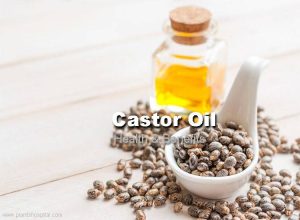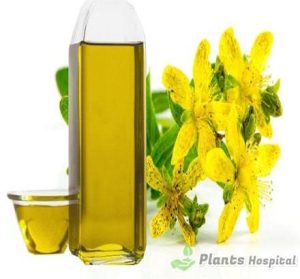Table of Contents
What is Clove Oil? Benefits Of Clove Oil
Clove Oil the dried flower buds of an aromatic tree cloves are used as a spice in cuisines all over the world.
Cloves are now harvested primarily in Indonesia, Madagascar, Pakistan, Sri Lanka, and India.
Clove is the immature flower bud of the clove plant that is harvested and processed for culinary and medicinal use.
The comprised of eugenol(85%), acetyl (wintergreen oil, found in many plants), Clove is the immature flower bud of the clove plant that is harvested and processed for culinary and medicinal use.
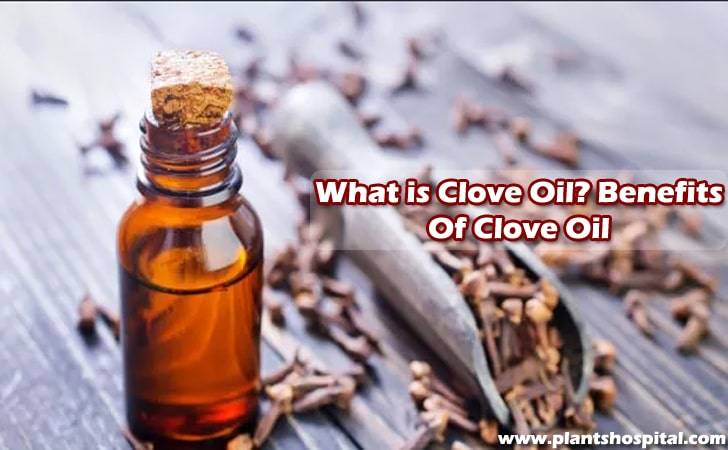
Types of Clove Oil
- Bud Oil is derived from the flower-buds of S.aromaticum. It consists of 60-90% eugenol, eugenol acetate, caryophyllene, and other minor constituents.
- Leaf Oil is derived from the leaves of S.aromaticum. It consists of 82-88% eugenol with little or no eugenol acetate, and minor constituents.
- Stem Oil is derived from the twigs of S.aromaticum. It consists of 90-95% eugenol, with other minor constituents.
11 Proven Benefits Of Clove Oil
1. Clove Oil Fight Disease
Cloves have antiseptic, disinfectant and germicidal properties. It is effective as a broad-spectrum antibiotic. Historically, dentists used powdered cloves to disinfect and treat tooth infections and treat gum disease.
(Their patients probably appreciated the numbing effect of the cloves. It is effective for the treatment of diarrhea and eradicating the fungus that caused the athlete’s foot. Several drops of clove oil diluted with garlic, olive or sesame oil can be dripped into the ear to disinfect ear canals and remedy the cause of ear infection.
Diluted clove oil can be used topically to treat acne, wounds, scabies, insect bites, and prickly heat.
2. Culinary Usage
The whole clove or a ground powder is used in cooking throughout the world. Cloves are rich in manganese. Cloves contain significant amounts of potassium, phosphorus, magnesium, and calcium.
Cloves are a good source of vitamins C and K, and to a lesser degree, vitamins A and B-complex. Cloves are also a great source of dietary fiber and omega-3 fatty acids.
3. Ease Pain and Inflammation
Cloves contain Eugenol, which relieves pain and inflammation. It can relieve toothaches and earaches. Clove oil spray has been used to help relieve bronchial inflammation and cough.
4. Nausea and Aid Digestion
Cloves are safe to use in pregnancy, and clove tea can ease the nausea and vomiting commonly referred to as morning sickness.
Cloves aid in digestion and can relieve gastric and intestinal gas. The stimulative effect of the clove aids the metabolic processes of the body.
5. Ease Spasms
Cloves have antispasmodic and expectorant properties. Topical use of clove oil can ease muscle spasms.
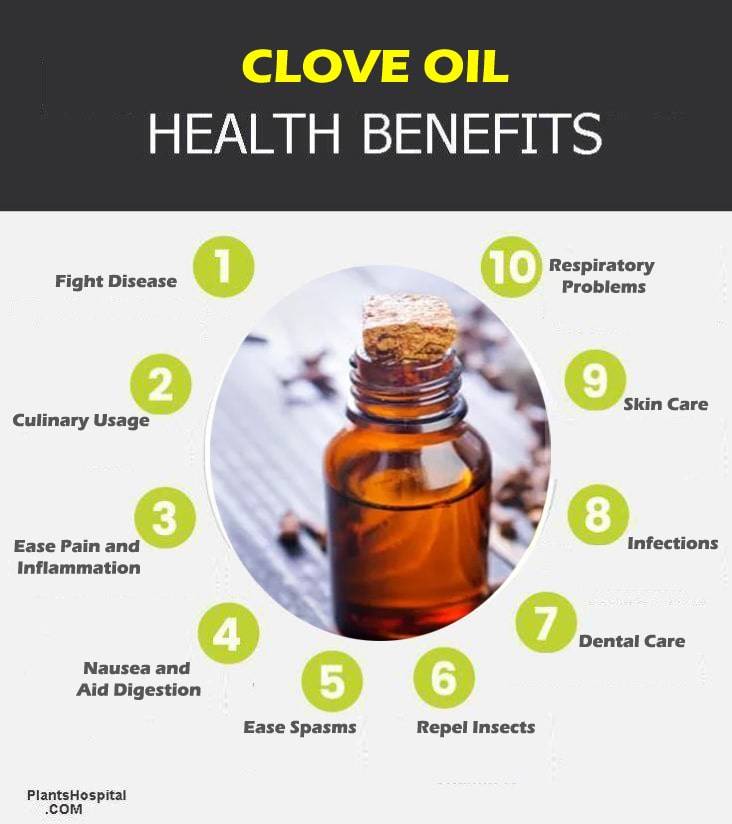
6. Repel Insects
A diet rich in cloves can repel insects. The clove oil creates a smell and taste insects don’t like, so they don’t bite you. Clove studded oranges have been used for hundreds of years in closets to repel moths and protect clothing.
Cloves have antispasmodic and expectorant properties. Topical use of clove oil can ease muscle spasms.
A diet rich in cloves can repel insects. The clove oil creates a smell and taste insects don’t like, so they don’t bite you. Clovestudded oranges have been used for hundreds of years in closets to repel moths and protect clothing.
7. Dental Care
The most prominent use of clove oil is in dental care. The germicidal properties of the oil make it very effective for relieving dental pain, toothache, sore gums, and mouth ulcers. It contains the compound eugenol, which has been used in dentistry for numerous years.
Gargles with diluted clove oil help in easing the throat. The characteristic smell of clove oil helps to remove bad breath.
As a result, it is added to numerous dental products and medications, including, mouthwashes, and toothpastes. Dentists also mix clove oil with zinc oxide and prepare a white filling material as a temporary alternative to the root canal.
8. Infections
Due to its antiseptic properties, clove oil is useful for wound, cuts, scabies, athlete’s foot, fungal infections, bruises, prickly heat, scabies, etc. It can also be used as insect bites and stings.
9. Skin Care
It is often recommended for skin care, especially to acne patients.
10. Respiratory Problems
It has a cooling and anti-inflammatory effect, and thereby clears the nasal passage. This expectorant is useful in various respiratory disorders including coughs, colds, bronchitis, asthma, sinusitis, and tuberculosis. Chewing a clove bud eases sore throats.
11. Ear Ache
A mixture of warm clove oil and sesame oil is a good remedy for earaches.
Indigestion: It is effective in stomach related problems such as hiccups, indigestion, motion sickness, and flatulence. Hence, clove one of the important spices added in Indian dishes.
How Clove Oil Works?
When you use clove oil for toothache pain, it’s the eugenol (an ingredient within clove oil) that provides relief. Eugenol is a natural anesthetic and antibacterial, and it works well at reducing inflammation in the mouth. A study that eugenol is much more effective than using another analgesic and doing nothing else.
Researchers examined the symptoms of 270 patients who had a tooth extracted, and found that patients who had received a eugenol-based paste suffered the least pain, inflammation and related after-effects.
Using Clove Oil for Toothache
You can buy clove oil as a home remedy from most supermarkets, health food stores, and drugstores. Sometimes the product is called “oil of cloves. “Keep in mind clove oil has an unpleasant taste and can have unpleasant side effects if eaten, so it should only be used for adults and older children who aren’t likely to swallow it by mistake.
For younger children or teething babies, suggests cut it with a carrier oil like almond or a similar child-safe preparation that contains clove oil as the active ingredient.
How To Make Clove Oil?
Pungent, piquant and peppery, cloves tie aromatics together in multifaceted dishes. You rarely find cloves as the main flavoring ingredient in a dish; they work best in supporting roles, such as infusions for finishing oils.
It is used to anoint a dish with a suspicion of clove in the finish not enough to alter the flavor profile but just enough to make you think, “This has a little something special,” and wonder what it is. It is easy to make, and a little goes a long way.
Step 1
Toast about half a tablespoon of cloves in a saute pan over medium heat for every cup of oil you want to infuse. Toasting the cloves mobilizes their volatile oils and makes them easier to extract.
Step 2
Wash the bottle and cap you’ll use for the clove oil, along with a mortar, pestle, and funnel. Fill the bottle with water and place it in a pot along with the mortar, pestle, and funnel.
Step 3
Cover the items in the pot with a few inches of water and boil for 10 minutes. Take the items from the water and invert them on a paper towel.
Step 4
Rinse the cloves in a colander under cool water and spread them out on paper towels to dry. Dry the mortar with a paper towel, if you need to, and pour the cloves in it while it’s still warm from boiling.
Step 5
Lightly tap the cloves with the pestle to crack them. Pour the cracked cloves in the container, followed by high-quality extra-virgin olive oil. Use the funnel if you need to.
Step 6
Tighten the lid or stopper on the bottle and store it in a cool, dry place out of direct sunlight. Shake the bottle every couple of days.
Step 7
Infuse the oil with the cloves for two weeks, then taste it. If you want a stronger flavor, let the cloves steep for a few more weeks. If the flavor is where you want it, strain the oil through a sieve lined with cheesecloth and into an airtight sterilized serving bottle or container.
Step 8
Store the clove oil in the refrigerator and use within 1 month.
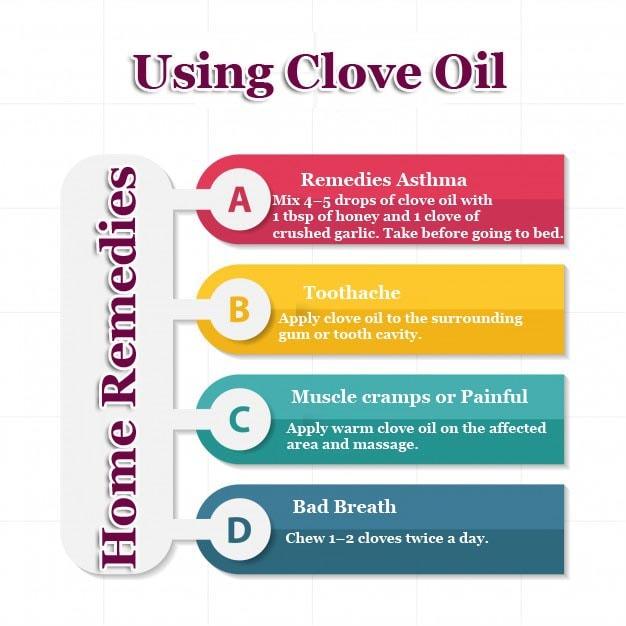
Home Remedies Using
Remedies Asthma
- Mix 4–5 drops of clove oil with 1 tbsp of honey and 1 clove of crushed garlic. Take before going to bed.
Fever
- Add 3 crushed cloves, 2 cardamoms, 2 tbsp of aniseed, 6–7 basil leaves, and 1 tsp of cinnamon to 2 cups of water. Boil and allow to simmer until it has reduced to half. Drink this herbal decoction, once or twice a day.
Toothache
- Apply this oil to the surrounding gum or tooth cavity.
Vomiting
- Fry ½ tsp of clove powder, mix with 1 tbsp of honey, and eat. Other uses Cloves are used to flavor foods and are mixed with turmeric, cinnamon, and chilies. In India, the clove is also mixed with other herbs and eaten with betel leaf as a breath freshener and digestive aid.


